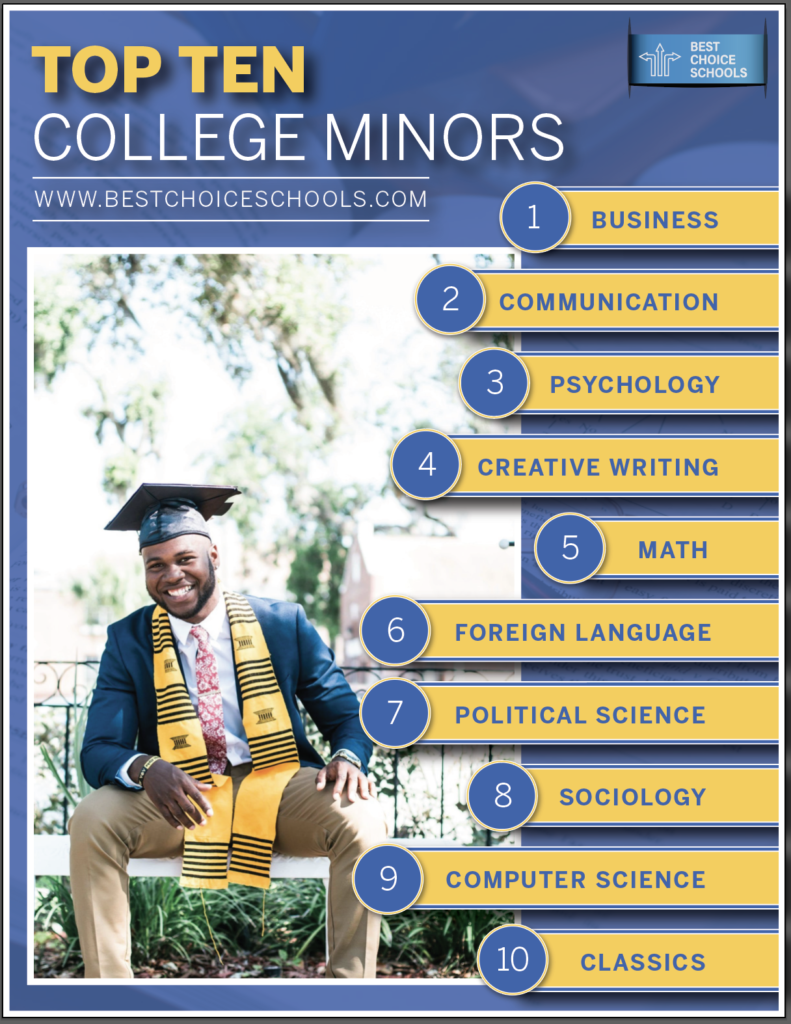
No matter where you go to college, eventually you will settle on a major. It may have taken a lot of soul-searching and research to get to the point of making a final decision, too. So, if selecting a minor seems like a bit too much to add to your plate right now, you’re not alone. Plenty of students leave a college minor off the table altogether.
However, choosing a minor might not be as much of a hassle as you think, and there are some excellent reasons to do so. Today we’ll talk about the advantages of choosing a minor in college, and some of the most popular options to pick from.
Table of Contents
What Is The Difference Between a College Major and a Minor?
Your academic major is the primary subject area you are committed to studying during your time at college. Often referred to as a “concentration,” your major affects not just the coursework you will undertake in college but also the kinds of jobs you will be qualified for upon graduation.
Most students are expected to choose a major by the end of their sophomore year. Depending on what you select, you will be completing both core and elective courses related to your area of study. These courses are designed to help you gain in-depth knowledge about a subject and prepare you for a career after you complete college. In some cases, you may need further education (such as a master’s degree) to sufficiently pave the way for a job in your field.
Some examples of popular majors include:
Bachelor’s in Criminal Justice
Bachelor’s in Computer Science
The first way a college minor differs from a major in that it is not a requirement. Instead, it’s a way for students to choose a second area of study that does not involve such a substantial academic commitment. Secondly, while a minor will add some additional coursework, it does not encompass the amount of responsibility you would have to take on by declaring a double major. Because of this, it can be a great way to enrich your college experience by exploring an additional interest.
Why Is a Minor Important?

If you’re trying to decide whether declaring a minor is the right choice for you, it’s essential to know why you would want to commit to one. You may even ask yourself, “What is the point of a college minor?” After all, if you’ve already decided upon a career path, what would be the purpose of taking on additional work?
In fact, there are several compelling reasons as to why you might want to declare a minor in college, including:
• You Are Not Sure Yet About Your Career Path
Depending upon where you are in your personal development, you might not be ready to decide “what you want to do with your life” just yet. This is perfectly understandable and normal. A minor may allow you to get your feet wet in another area of study if you’re feeling undecided.
• To Compliment Your Chosen Major
Some minors complement specific majors so perfectly that completing them can be to your advantage. Examples include a finance major minoring in math or statistics, or an English major minoring in journalism.
• Your Discipline Is Only Offered as a Minor
If you decide on a specific path of study that your university does not offer as a major, you might choose a minor if you want to continue your education without transferring schools
• You Want To Study Two Subjects Simultaneously
You may wish to declare a minor when two subjects pique your interest, and you can’t decide which one you want to study more.
• You Are Passionate About Something You Can’t Do Without
Let’s say your head tells you that a business degree is a smart move for your future, but in your heart, drawing is your passion. Majoring in business with a minor in art can help you fulfill both needs.
• You Want To Increase Your Chance of Being Accepted To Grad School
If you plan on continuing your education after obtaining your undergraduate degree, a minor may help your application stand out and demonstrate that you have additional interests and skills beyond one area of study.
• You Want To Improve Your Career Prospects
There’s no doubt that a major coupled with a minor can be impressive to some employers. Professionally speaking, your minor may provide you with practical skills not gained while studying your major, and it doesn’t look bad on a resume either.
Why Not Just Declare a Double Major?
Choosing both a major and a minor is not the same as declaring a double major, which has students focus on two academic subjects. With a double major, you will be required to take up to 12 classes in each of your chosen subjects. It’s a tremendously rigorous course load, and while it can lead to increased opportunities, it’s not a decision to take lightly.
By contrast, a minor can offer many of the same benefits as a double major—more networking opportunities, increased exposure to new experiences, and an expanded skill set.
So, should you choose a double major or a minor? The choice is really up to you. If your goals are exceptionally ambitious and you have what it takes to complete the additional coursework, a double major might make sense. But if you are on the fence, the logical choice is to choose a minor instead.
Knowing your own limitations and weighing the pros and cons of both choices is the key to deciding which one is right for you.
When Should a Student Not Declare a Minor?

As we’ve seen, there can be many benefits to minoring in an additional subject while attending college. However, going after a minor can have some disadvantages to consider as well. Not everyone can or should declare a minor. Here’s when it doesn’t make sense:
• When Pressure To Choose a Minor Is Causing You Unwanted Stress
Pushing yourself to greater things is admirable, but if you find that the pressure to choose a minor is making you anxious and on edge, you might be expecting too much from yourself. Slow down and take a deep breath. You have the rest of your life ahead of you, and you’re in charge! There will be plenty of opportunities for learning additional subjects and skills when and if you choose to do so.
• You’re Declaring a Minor Because You Think You Should
If you are considering a minor just because you think it’s the “right” thing to do, or it “might be fun,” these are not compelling reasons to tie up your time with more coursework. Wait until you have a better handle on your goals and aspirations before choosing a second area of study.
• You Don’t Have Time To Meet the Requirements
If your academic schedule is already full, will you even have time to meet your minor’s requirements before graduation? Everyone has the same 24 hours in a day, and as the old saying goes, “you can only do what you can do.”
• You’re Barely Scraping by With Academics as It Is
If you’re already struggling to complete the required coursework for your major, taking on the additional burden of even more classes can lead to fatigue and burnout. Learning should be enjoyable (or at least satisfying), not frustrating. Don’t make it harder for yourself if the additional work is not realistic for you.
• When It’s Going To Cause Financial Hardship
If you can’t use your electives to complete your minor, or you need to add a semester of classes, you could incur additional expenses. This is also several more months you won’t be in the workforce earning a salary.
Does My Minor Have To Relate To My Major?
The short answer is no. While there are advantages to having your minor pair well with your major, these benefits are secondary to expanding your mind and exploring a topic that interests you. When it comes to landing a career after college, the star of the show is your bachelor’s degree, so any minor you choose will pale in comparison to that achievement.
Think of your minor as a way to broaden your horizons and provide you with unique insights from a different perspective. Of course, if you want to go with something related to your academic degree choice, you can, but this is one instance where you have the option to pick something you are genuinely curious or passionate about.
Will a Minor Increase My Marketability After College?
Because a minor allows you to add skills and training in another area, naturally, your marketability will increase. The more proficiency you have across a range of disciplines, the more attractive you will be to a prospective employer. Organizations look for value and depth in an individual and adding a minor to your portfolio definitely boosts your resume.

What Factors Should Be Included When Choosing a College Major?
If you’ve looked over the benefits and disadvantages of choosing a minor and decided to go for it, what are the most important factors to consider when making a selection?
This is where things get a little tricky. Some experts believe that your minor should align with your passions while others focus on skill-building to add to your employability.
The truth is that both camps are right, and the considerations when choosing a minor will vary depending on a student’s individual goals. These goals may be personal, career-oriented, or both, and one is not better than the other; they are simply different. As such, the most crucial element in choosing a minor comes down to whether you want to or you don’t. The question of whether it will be a useful minor for you is what you really need to ask.
What Are The Top 10 College Minors?

While popular minors can trend widely across institutions, some tried and true favorites never seem to go out of fashion:
Business
Business minors will find that this path offers a robust set of skills that can benefit them no matter what they major in. Students learn communication, teamwork, analytical thinking, and other soft skills that are in demand in every career.

Communication
Students who minor in communication will gain lifelong skills in public speaking, verbal and non-verbal communication, persuasion, relationship-building, conflict resolution, and other essential competencies that will carry over to any line of work.
Psychology
Interpersonal awareness, an understanding of what drives human behavior, communication, teamwork, and empathy are soft skills that many employers highly appreciate. Psychology minors have the advantage of learning about what motivates people and how to get along with others.
Creative Writing
Writing is an integral part of many careers and a skill that can help students perform better academically. Good writing skills are an excellent complement to any major, whether its political science, business, or education.

Math
Employers value critical thinking, problem-solving and analytical skills, and students who want to go on to further study in physics, engineering, or other hard sciences can find practical math especially useful. Since mathematics stresses the practical applications of using formulas to make careful deductions, this minor is ideal for developing new ways of thinking.
Foreign Language
No matter what language you minor in, the benefits of mastering another tongue include improved memory, multi-tasking, and communication skills. Because business is becoming increasingly globalized, students who can converse in more than one language have a distinct advantage over those who do not.
Political Science
As a political science minor, you’ll learn how to analyze information, conduct research, communicate persuasively, and sharpen your critical thinking skills. You’ll also gain above-average knowledge of public policy and politics. These competencies can complement many majors as well as stand out on a resume.
Sociology
Minoring in sociology is a popular choice that can complement students who are considering careers in government, education, human resources, health care, and many other fields. By learning how organizations work and how social context shapes decision making, you will be prepared to solve problems in the real world.

Computer Science
In many fields, a strong foundation in computer science is not only helpful; it’s necessary. As a computer science minor, you will develop basic computer science proficiency as you learn the primary concepts, software, and technologies involved in this discipline. For those who plan to pursue a graduate degree in engineering, minoring in computer science will assist you in future studies.
Classics
Studying the classics can enhance your English skills and impart a unique perspective as you explore the ancestral languages and literature that make up our modern culture. As a classics minor, you will develop a new way of thinking that can help you apply ancient solutions to modern problems.
Related Articles:
10 Tips for Choosing the Best College